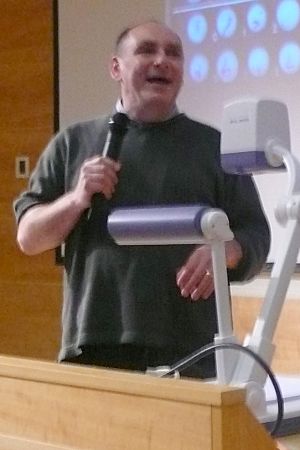Jon Crowcroft facts for kids
Quick facts for kids
Jon Crowcroft
FRS FREng
|
|
|---|---|

Crowcroft in 2009
|
|
| Born |
Jonathan Andrew Crowcroft
23 November 1957 England
|
| Nationality | British (English) |
| Education | Westminster School |
| Alma mater | University of Cambridge (BA) University College London (MSc, PhD) |
| Awards | ACM Fellow (2002) SIGCOMM Award (2009) |
| Scientific career | |
| Fields | Computer Networks Distributed systems Quality of service |
| Institutions | University of Cambridge University College London |
| Thesis | Lightweight protocols for distributed systems (1993) |
| Doctoral advisor | Peter T. Kirstein |
| Doctoral students | Mark Handley Pan Hui |
Jonathan Andrew Crowcroft (born 23 November 1957) is a very important professor in the world of computers. He is known as the Marconi Professor of Communications Systems at the University of Cambridge. He also works as a visiting professor at Imperial College London. Professor Crowcroft helps lead the program committee at the Alan Turing Institute.
Contents
Early Life and Education
Jon Crowcroft's father was a psychiatrist named Andrew Crowcroft. His mother, Kyla Greenbaum, was a talented concert pianist. Jon went to Westminster School when he was younger.
University Studies
He studied physics at the University of Cambridge and earned his first degree in 1979. He was a student at Trinity College, Cambridge. Later, he continued his studies at University College London. He received a Master of Science degree in computing in 1981. He then completed his PhD in 1993, also from University College London.
Career and Research in Computer Networks
Professor Crowcroft joined the University of Cambridge in 2001. Before that, he was a professor at University College London. He taught about networked systems in their Computer Science Department. After he left UCL, one of his former students, Mark Handley, took over his role. Since 2020, he has been a Fellow at Wolfson College, Cambridge.
Contributions and Projects
Jon Crowcroft has helped start several successful projects. He has been a member of the Scientific Council of IMDEA Networks Institute since 2007. He also served on the advisory board for the Max Planck Institute for Software Systems.
He has written and edited many books and articles. These publications are used in academic courses around the world. Some of his well-known books include TCP/IP & Linux Protocol Implementation and Internetworking Multimedia.
Advanced Network Ideas
Professor Crowcroft has also done research in a field called network science. He has explored ideas like "Turing switches." He suggested using special hardware for packet switching instead of general computers. He also looked into using optical technology for this purpose. He is a director of the Matrix Foundation.
Awards and Recognitions
Jon Crowcroft has received many important awards for his work. These awards show how much he has contributed to computer science.
Prestigious Fellowships
In 2013, he was chosen as a Fellow of the Royal Society. This is a very high honor for scientists. His nomination mentioned his important work on the Internet. His research on satellite links in the 1980s helped create rural broadband. His work on standards for video and voice on IP networks helped bring multimedia to the Internet. In the 2000s, he also started the field of "opportunistic networking."
He became an ACM Fellow in 2003. He is also a chartered fellow of the British Computer Society. He is a Fellow of the Institution of Electrical Engineers and the Royal Academy of Engineering. In 2004, he became a Fellow of the Institute of Electrical and Electronics Engineers (IEEE).
Internet Engineering Leadership
From 1996 to 2002, he was a member of the Internet Architecture Board. He attended most of the first 50 meetings of the Internet Engineering Task Force (IETF). These groups help guide how the Internet works and develops.
Professor Crowcroft was the general chair for the ACM SIGCOMM conference from 1995 to 1999. He received the SIGCOMM Award in 2009. This award recognized his "pioneering contributions to multimedia and group communications." It also praised his "endless enthusiasm and energy" and his "creative ideas."
 | Delilah Pierce |
 | Gordon Parks |
 | Augusta Savage |
 | Charles Ethan Porter |

